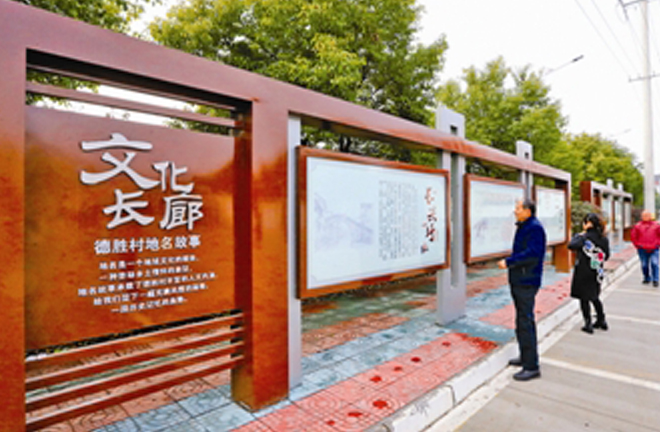Cultural development can invigorate rural heritage

Villagers read the introductions of places along a cultural corridor, which serves as a form of cultural development in rural areas. Photo: JSCHINA
Rural culture is deeply rooted in traditional Chinese culture and carries the feeling of nostalgia passed down for generations. However, in the process of rapid industrialization and urbanization, rural culture has been eclipsed. Some scholars hold that the rural vitalization strategy put forward by the 19th National Congress of the Communist Party of China provides opportunities for cultural development to invigorate rural areas.
Zhuang Jincai, a professor from the School of Management at Jiangsu University, said that the rural vitalization strategy aims to transmit, develop and enhance traditional rural culture. Cultural protection, transmission and innovation endow rural culture with new meanings and rich forms of expression, and they play an important role in rallying public support, enlightening the public and purifying the social atmosphere, thus providing a significant opportunity for the development of rural culture.
Liu Chen, an associate professor from the Teaching and Research Department of Social and Ecological Civilization under the Party School of the Central Committee of the CPC (National Academy of Governance), said that the goal of the development of rural culture is to pass down traditional culture and protect lucid waters and lush mountains. Against the backdrop of agricultural modernization and integrated urban-rural development, the vitalization of rural culture aims to reinvigorate rural areas, pinpoint the position of rural culture in modern civilization and further achieve revitalization and reconstruction. Based on the revitalization of traditional culture, we should meet farmers’ diverse cultural demands, safeguard their cultural rights, establish a new spirit and ideal, raise farmers’ cultural self-awareness, and cultivate talent for the construction of a new countryside.
In recent years, the emergence of rural cultural industries has embodied the vitality of rural culture. Sun Lijun, dean of the School of Literature and Journalism at Shandong University of Finance and Economics, said that the integration of cultural creativity and agricultural resources endows agricultural resources with spiritual and cultural significance through designs and symbols, which is an effective way to increase agricultural products’ cultural value-added, to cultivate featured agriculture and brand-name products, to form cultural industries with rural characteristics, and to speed up the transformation and upgrading of the mode of rural development and related activities.
Zhuang added that we should assume an attitude of separating the wheat from the chaff when passing down and developing rural culture, achieving a dynamic coexistence, and advancing urban-rural culture by promoting urban-rural cultural integration through interaction. Meanwhile, we should lay a solid foundation for rural cultural communication by attracting talent back to rural areas. As an important force for vitalizing rural culture, the return of talent can help fill the lack of qualified persons.
edited by SU XUAN

 PRINT
PRINT CLOSE
CLOSE